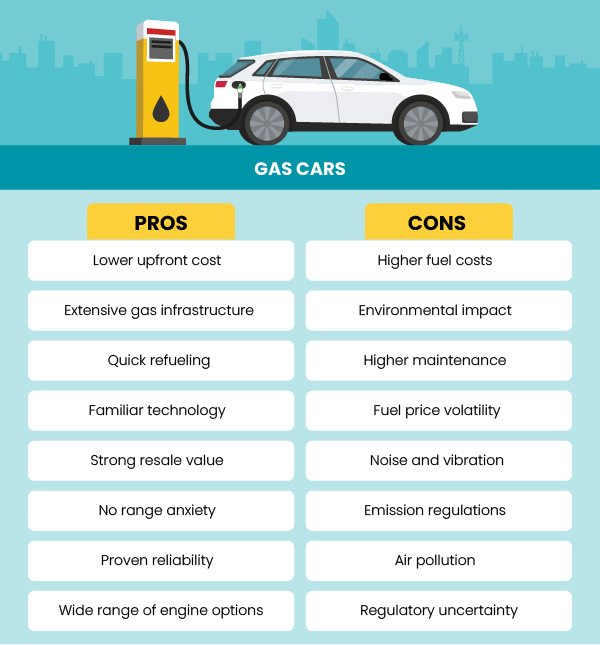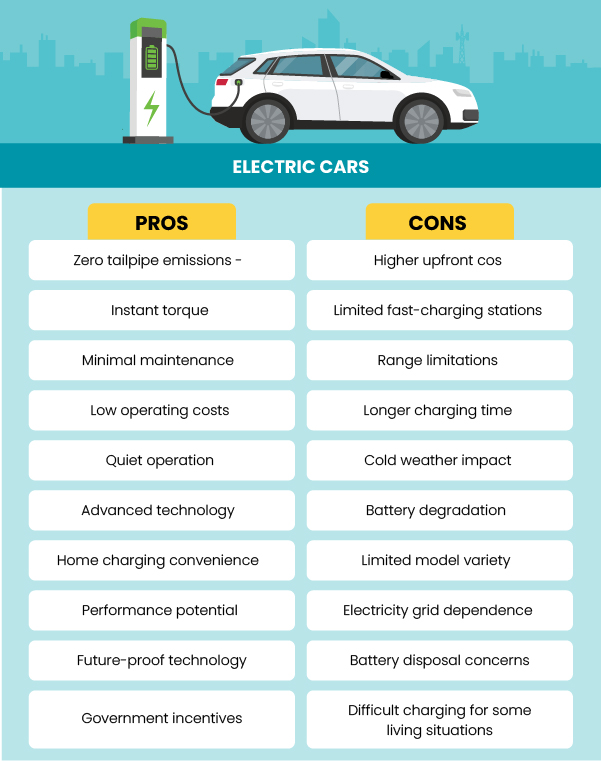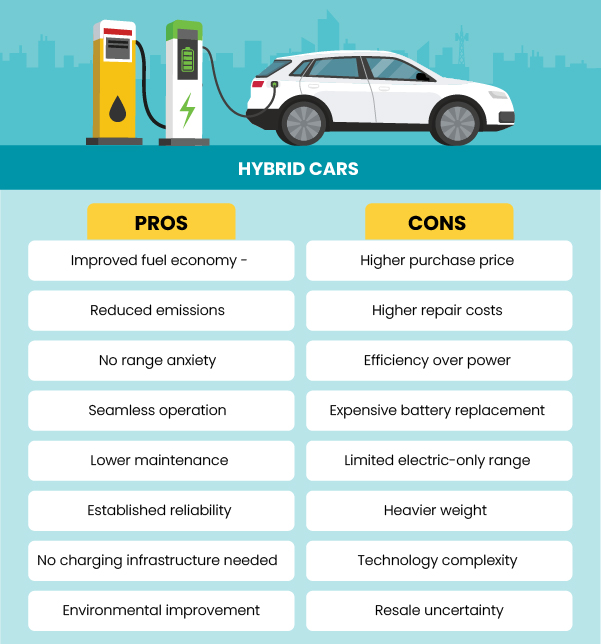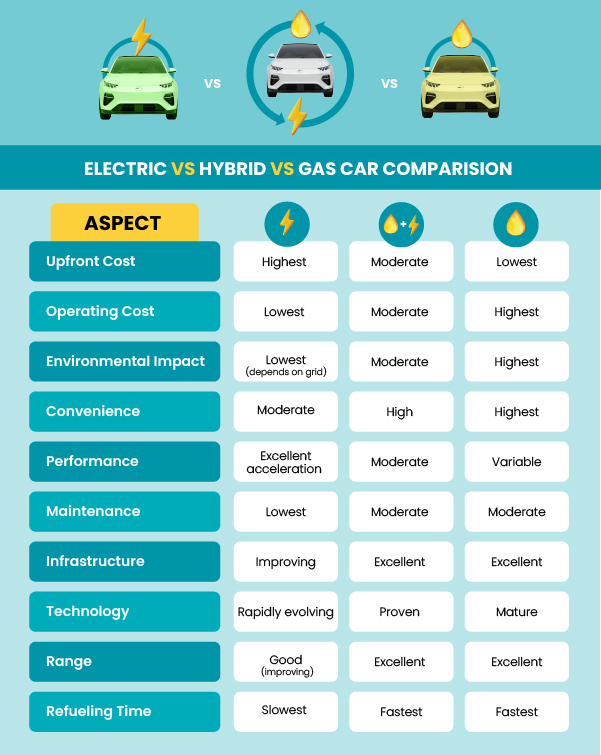The electric vs hybrid vs gas cars debate has moved from automotive enthusiast forums to every driveway decision worldwide. What should your next car be? Do you stick with a gas engine’s familiar reliability, embrace a hybrid’s balanced efficiency, or leap into the electric revolution?
With alternative fuel vehicles now representing over 30% of global car sales in 2024 – a dramatic surge from just 3% a decade ago, this choice has evolved from an environmental statement to a mainstream necessity. The challenge isn’t simply having more options; it is taking a decision where each powertrain technology offers distinct advantages, trade-offs, and long-term implications for your wallet, lifestyle, and daily commute.
Whether you’re a performance enthusiast, efficiency optimizer, or sustainability-minded driver, understanding the real-world differences between these three powertrains is important.
Understanding the Contenders
Gas Cars
Gas-powered vehicles remain the backbone of American roads and roads in many other countries too, and for good reason. These internal combustion engine (ICE) vehicles have been refined over more than a century, delivering the performance characteristics that many car enthusiasts still crave. The immediate throttle response, the soundtrack of a well-tuned engine, and the convenience of a five-minute refuel make gas cars a compelling choice.
From a practical standpoint, gas cars offer unmatched convenience. With gas stations on virtually every corner, range anxiety is practically non-existent. The infrastructure is mature, maintenance is widely understood, and the initial purchase price is often the most accessible of the three options.
However, gas-powered cars face challenges due to carbon emissions, rising fuel costs, and stricter regulations, making their future uncertain compared to electric and hybrid vehicles.
Electric Cars: The Future is Now
Electric vehicles (EVs) represent the most dramatic shift in the electric vs hybrid vs gas cars area. EVs produce no tailpipe emissions, making them the cleanest option for local air quality. The driving experience is remarkably different – instant torque delivery, whisper-quiet operation, and minimal maintenance requirements.
The technology has matured significantly., with BEV sales growing from 7.4% of the U.S. LDV market in 2Q24 to 8.9% in 3Q24. Modern EVs offer impressive performance capabilities, often out accelerating their gas counterparts while providing a uniquely smooth driving experience.
However, the electric vs hybrid vs gas cars debate highlights some current limitations. Battery electric vehicles’ average transaction prices increased from $55,500 in December 2024 to $59,200 in March 2025, compared with the average price of all new vehicles, which decreased from $49,700 to $47,500. This price premium, combined with charging infrastructure concerns, remains a consideration for many buyers.
Hybrid Cars: The Balanced Approach
Hybrid vehicles represent the middle ground in the electric vs hybrid vs gas cars discussion. Hybrid vehicles produce lesser emissions and have better fuel economy than a traditional vehicle by combining a gas engine with an electric motor and battery system. This dual-powertrain approach offers the best of both worlds – the efficiency of electric power for city driving and the range of gasoline for longer trips.
The appeal of hybrids lies in their seamless operation. The transition between electric and gas power is virtually undetectable to the driver, and the reliability of hybrids as a whole is similar to gas-only vehicles. This makes them an excellent stepping stone for drivers hesitant to fully commit to electric but wanting to reduce their environmental impact.
Hybrid vehicles made up 10.6% of the U.S. LDV market in 3Q24, a record, showing growing consumer confidence in this technology. The recent surge in hybrid adoption suggests that many drivers appreciate the reduced range anxiety while still enjoying improved fuel economy.
Performance Showdown
When car enthusiasts evaluate the electric vs hybrid vs gas cars debate, performance often takes center stage. Each powertrain offers distinct characteristics that appeal to different driving preferences.
Gas cars deliver the traditional performance experience that many enthusiasts cherish. The linear power delivery, engine braking, and acoustic feedback create an engaging driving experience. High-performance gas vehicles can achieve remarkable acceleration and top speeds, with the added benefit of quick refueling for extended track sessions.
Hybrid vehicles in the electric vs hybrid vs gas cars comparison often prioritize efficiency over outright performance. Hybrids are designed for greater fuel efficiency, which can cause performance to suffer when compared with gas-powered vehicles. However, modern performance hybrids like those from Toyota’s GR lineup or Honda’s Type R hybrid systems prove that efficiency and excitement can coexist.
Electric vehicles are rewriting the performance playbook entirely. The instant torque delivery means EVs can achieve blistering acceleration figures that would require exotic engineering in gas cars. The low center of gravity from floor-mounted batteries also contributes to exceptional handling characteristics that many driving enthusiasts find surprisingly engaging.
Cost Analysis: Beyond the Sticker Price
The electric vs hybrid vs gas cars cost comparison extends far beyond the initial purchase price. While gas cars typically offer the lowest upfront cost, the total cost of ownership tells a more complex story.
Gas cars face ongoing fuel costs that can vary significantly based on driving habits and fuel prices. Maintenance costs are moderate but consistent, requiring regular oil changes, transmission services, and periodic repairs to complex mechanical systems. The resale value of gas cars remains strong, particularly for popular models.
Hybrid vehicles typically command a premium over comparable gas cars, but this is often offset by improved fuel economy. The electric vs hybrid vs gas cars equation shows hybrids requiring less maintenance than gas cars due to reduced engine wear, though the dual-powertrain system can mean higher repair costs when issues arise.
Electric vehicles currently have the highest purchase prices, but owning an EV would always be cheaper when considering total cost of ownership. Electricity costs significantly less than gasoline per mile, and maintenance requirements are minimal due to the simplicity of electric drivetrains. However, potential battery replacement costs and rapid technology evolution can impact long-term value.
Gas Vs Hybrid Vs Electric Car Comparison
Environmental Impact: The Green Factor
Environmental considerations play an increasingly important role in the electric vs hybrid vs gas cars decision. Each option offers different environmental trade-offs that conscientious buyers should consider.
Gas cars have the highest direct environmental impact through tailpipe emissions. However, the established recycling infrastructure for steel, aluminum, and other traditional automotive materials provides some environmental benefits at the end of the vehicle’s life.
Hybrid vehicles offer a meaningful improvement in the electric vs hybrid vs gas cars environmental comparison. By reducing fuel consumption and emissions, hybrids provide a more environmentally friendly option while maintaining the convenience of gas-powered vehicles.
Electric vehicles offer the greatest potential for environmental benefit, particularly as the electrical grid becomes cleaner. Total emissions associated with driving EVs are still typically less than those for gasoline cars—particularly if the electricity is generated from renewable energy sources like wind. However, battery production and disposal present their own environmental challenges that the industry continues to address.
The Practical Considerations
When examining the electric vs hybrid vs gas cars debate from a practical standpoint, several factors influence the decision beyond performance and cost.
Infrastructure availability varies significantly by region. Gas stations are ubiquitous, making gas cars the most convenient option for long-distance travel. Hybrid vehicles share this advantage while offering improved efficiency for daily driving. Electric vehicles require more planning for longer trips, though the charging network is expanding rapidly.
Daily driving patterns significantly influence the electric vs hybrid vs gas cars choice. Urban drivers with predictable routines may find electric vehicles ideal, while those with variable schedules or frequent long trips might prefer hybrids or gas cars. The average American drives about 40 miles per day, well within the range of modern EVs, making electricity a viable option for most drivers.
Weather considerations also play a role. Cold weather can reduce electric vehicle range, while gas and hybrid cars maintain consistent performance across temperature extremes. However, EVs offer advantages like pre-conditioning while plugged in and no cold-start issues.
Making Your Decision
The electric vs hybrid vs gas cars choice ultimately depends on your individual priorities, driving patterns, and values. You should consider your primary use cases, performance preferences, and long-term ownership plans.
If you prioritize proven reliability, extensive infrastructure, and traditional performance characteristics, gas cars remain a solid choice. The immediate availability of parts and service, combined with lower upfront costs, makes gas vehicles attractive for budget-conscious buyers or those in rural areas.
Hybrid vehicles provide improved efficiency and reduced environmental impact while maintaining the convenience and familiarity of gas-powered vehicles. This makes them ideal for drivers ready to embrace some new technology without fully committing to electric.
Electric vehicles represent the future of automotive transportation and offer unique advantages for the right buyer. The combination of environmental benefits, low operating costs, and impressive performance makes EVs compelling for environmentally conscious drivers with predictable driving patterns and access to charging infrastructure.











